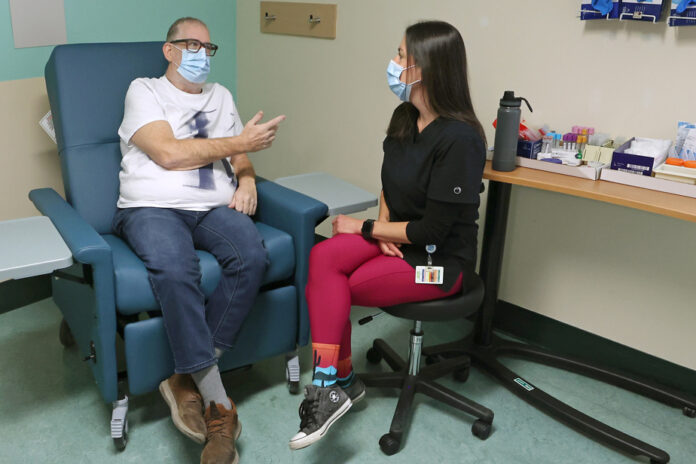Patients who are urgently investigated no longer need to be hospitalized while waiting for their tests. A service offered at Maisonneuve-Rosemont Hospital now allows them to return home between their appointments and obtain personalized follow-up, a new way of doing things that could free up several hundred hospital beds per year.
Last January, Bernard Grenier, a Quebecer who was enjoying the hot weather in Florida, woke up with a massive mass on his neck. “It was almost as big as a baseball. Half a baseball,” he said. The next day, while taking his shower, he felt a mass under his arms, at armpit level. Then another on the back of his neck.
After consulting a doctor in Florida, he is told that he may be suffering from cancer. However, he must do more extensive tests to confirm it and to start treatment quickly.
After rushing back to Quebec, Mr. Grenier went to the emergency room at Maisonneuve-Rosemont Hospital in early February. The same day, he was transferred to the outpatient investigation service.
This investigation service, offered throughout the province for several years, has been revisited at Maisonneuve-Rosemont Hospital. In addition to letting patients go home between appointments, its new “advanced” service also allows them to get personalized tests based on their condition and close follow-up from doctors within hours.
In two weeks, Mr. Grenier passed a panoply of tests: blood tests, lung and abdominal scan, colonoscopy, cardiac ultrasound, brain MRI, lumbar puncture, hematology consultation. Each time, he returned home between appointments.
“Before the program, Mr. Grenier would have stayed five or six days hospitalized in the emergency room to have all these exams,” explains Lyne De Grasse, coordinator of the ambulatory investigation service. “What we offer is that the patient stays at home, but that their investigation times are the same as if they had stayed in the hospital. He has the same close follow-up, he can call us for the slightest question, but in the comfort of his home, ”adds the assistant head nurse, Agathe Dubourg.
Bernard Grenier finally got his diagnosis at the end of February. The man, who has lymphoma, was transferred to oncology, where he is undergoing chemotherapy treatments.
Bernard Grenier considers himself fortunate to have been able to avoid hospitalization.
The man developed a strong relationship of trust with the nurse who accompanied him to the investigation department. “Annabelle is my new best friend,” he says, smiling. She is competent, she is fast, she is efficient. She had the same cancer as me. It brings you closer, it reassures you. »
The clinical nurse, Annabelle Dufour, also had lymphoma about ten years ago. “I was hospitalized for two weeks to do all the scans, biopsies, blood tests. Everything that Mr. Grenier had through the service, I had him hospitalized, ”she explains.
His hospitalization was an “extremely unpleasant” experience.
Some patients, however, are anxious about being left on their own at home. “But we’re easy to reach, so patients can email me or call me if they have questions and we try to reassure them as much as possible,” she says.
The advanced investigation service, set up in June 2021, continues to grow. In 2022-2023, the service received more than 300 patients. A total of two administrative officers, two nursing assistants, eight nurses and one assistant work there.
“I hope the ward will get bigger, bigger, bigger, and then take more and more space in the way we practice medicine,” says Dr. Stephane Ahern, internist and intensivist at Maisonneuve-Rosemont Hospital, who collaborates regularly with the investigation service.
However, this service is not offered to all patients. “Eastern Montreal unfortunately has complex socio-economic determinants. This service, for a patient who has little or no money and who lives in Pointe-aux-Trembles, who has difficulty getting around and who has no help, I cannot offer it to him.” , he illustrates.
Called to react, the president of the Council for the protection of the sick, Paul Brunet, said he saw only positive things in the program. “The patient, in general, he likes to go home as much as possible. Returning them to their homes, to their loved ones, is not a bad idea,” he concluded.


















